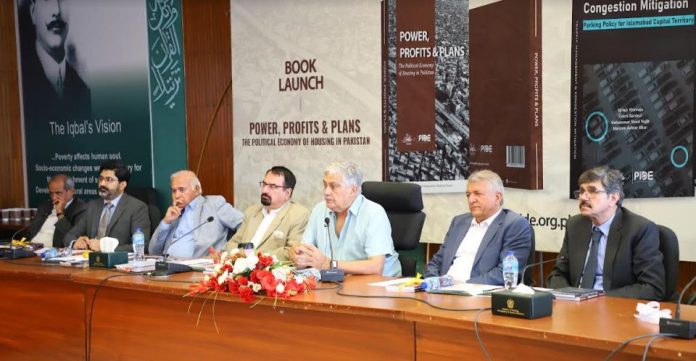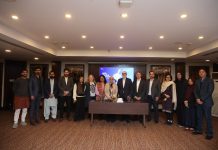PIDE has also proposed introducing paid Parking in Islamabad to mitigate traffic congestion in the city; 69.3% of the parkers are willing to pay for Parking
Mahnoor Ansar
Islamabad, JUL 12: /DNA/ – Pakistan Institute of Development Economics (PIDE) and RASTA jointly hold a book/report launch event at the Planning Commission of Pakistan, Islamabad.
The highly anticipated gathering brought together esteemed experts, policymakers, and stakeholders to address the urgent challenges surrounding the housing sector in the country.
Dr. Nadeem Ul Haque, Vice Chancellor of the Pakistan Institute of Development Economics (PIDE), addressed the audience and highlighted key challenges and opportunities in the sector.
“Power, Profit & Plans” delves into the political economy of housing in Pakistan, uncovering the unequal development patterns and socio-economic disparities prevalent in the urban landscape. The Book underscores the pressing need for institutional and policy reforms, highlighting the role of improved governance in addressing the housing crisis. The Book offers a comprehensive analysis and roadmap for addressing Pakistan’s housing challenges.
Mr. Nasir Javed, Editor of the book, apprised the participants by presenting key features of the Book titled: “Power, Profit & Plans: The Political Economy of Housing in Pakistan” is a multi-author book that highlights that urbanization in Pakistan, addition to the Slow and Steady flow of economic migrants from a rural area, had added at least six spikes starting with the migration of 1947, wars, floods, terrorism, etc. These unusual spikes placed pressure on urban housing, coupled with rapid population growth and institutional inefficiencies and complexities, described as ‘institutional spaghetti,’ has led to the housing crisis.
While speaking at the occasion, Mr. Pervaiz Latif Qureshi, Urban Development Expert, said that the Book offers a number of policy, institutional, financing, and taxation reforms that are likely to improve housing affordability, especially for the middle and lower classes.
PIDE has also proposed introducing paid Parking in Islamabad to mitigate traffic congestion in the city. The Pakistan Institute of Development Economics (PIDE) also launched a study on introducing paid Parking in Islamabad at the occasion.
Speaking at the book launch titled “Traffic Management & Congestion Mitigation: Parking Policy for ICT”, in his presentation by Dr. Idrees Khawaja, Former Chief of Research, PIDE, said that the study undertaken on the demand of the Capital Development Authority argues that free Parking is, in a sense a subsidy to car owners and encourages car use beyond the optimal limit.
The idea of the study emerged in a meeting between VC PIDE Dr. Nadeem Ul Haque and the then Chairman CDA, Mr. Amer Ali Ahmed, in January 2022. Dr. Haque proposed introducing paid Parking in Islamabad to reduce traffic congestion. Mr. Ahmed jumped on the idea and formally asked PIDE to propose the conceptual design and determine the idea’s viability.
To devise a parking plan for Islamabad on a pilot basis, the PIDE team surveyed 66 parking locations in 17 busy markets of Islamabad. The survey was undertaken to determine the demand and supply of Parking. The survey findings suggest that in several locations and during several hours of the day, the demand for Parking exceeds the supply, leading motorists to spend considerable time cruising for Parking, spending extra fuel, and Parking in the streets. A survey was also undertaken at selected locations to assess the willingness to pay for Parking. The findings suggest that 69.3% of the parkers are willing to pay for Parking.
The conceptual design of parking lots and other designated parking places, recommended by the PIDE study, would have the following elements: Car parking stalls, Motorbike parking stalls, buffers; sidewalks & frontages; crosswalks, ramps & bollards; vegetation medians & green parking stalls, Accessibility to Parking for differentially abled persons, Bus stops, delivery parking & taxi stand. Parking of cars at different angles (perpendicular, parallel, 30°, 45°, and 60°) has been recommended depending on the layout of the parking lot and other situational factors. The study recommends the installation of parking meters and the developing of a parking app to collect parking fees. The study contains suggestions on viable meters and gives a prototype of the proposed parking app for collecting parking fees. The entire mechanism must be monitored by CCTV cameras and supplemented by manual monitoring by traffic wardens.
The study has also worked out the financial viability of the suggested parking plan. Using the average parking demand based on the survey and a flat rate of Rs.30 per hour, the net revenue, after accounting for all costs from just 30 parking lots in seven locations, would be around Rs.51 million per month. Assuming that parking demand may decline by as much as 50 percent with the launch of paid Parking, the net monthly revenue would be Rs.32 million.
The study recommends three pricing options to be used as the situation warrants – a fixed price, regardless of the time of the day and duration for which the car is parked; peak hour pricing, involving higher parking fee at peak hours and marginal pricing, that is, increase in parking charges with the duration for which the car is parked.
While discussing the report, Mr. Amir Ali Ahmed, Secretary of the Benazir Income Support Programme, said that the study emphasizes curbing car use rather than raising revenue. Reduction in car use is possible only if alternate means of transport are available; therefore, adequate alternate mobility means are vital to achieving traffic mitigation through paid Parking. PIDE’s‘willingness to pay for parking survey’ suggests that most people visiting the markets in Islamabad have a travel distance of less than 30 minutes. This implies that most of those visiting Islamabad’s markets come from within Islamabad.
The two metro lines and the three recently introduced bus lines that bring commuters from the outskirts of Islamabad to the city center are already in operation. After carefully examining the routes of the available options, to fully cater to the travel demand within Islamabad, PIDE’s study proposes 14 additional public bus or shuttle routes in Islamabad. Detail of these routes is given in the report.
Finally, the study recommends an awareness campaign to create a buy-in for the Parking. Resistance is likely to come from shop owners, who might apprehend that this will reduce their customers. They need to be convinced with evidence that ease of Parking for the motorist is, in fact, likely to increase their customers.
The study was undertaken by a team comprising Dr. Idrees Khawaja, Dr. Zehra Gardezi, Shaaf Najeeb & Maryum Akhtar. Dr. Nadeem Ul Haque actively guided the team.
Dr. Faheem Jehangir, the Director of the RASTA Project, wrapped up the session by providing the audience with valuable updates on the continuous endeavors of RASTA. He stated that RASTA, which stands for “Research for Social Transformation and Advancement,” is Pakistan’s most comprehensive social sciences research network. The primary objective of RASTA is to establish a research culture and a network of academics and think tanks throughout Pakistan. By generating high-quality, evidence-based policy research, RASTA aims to contribute to the informed decision-making process in shaping Pakistan’s public policies.

















